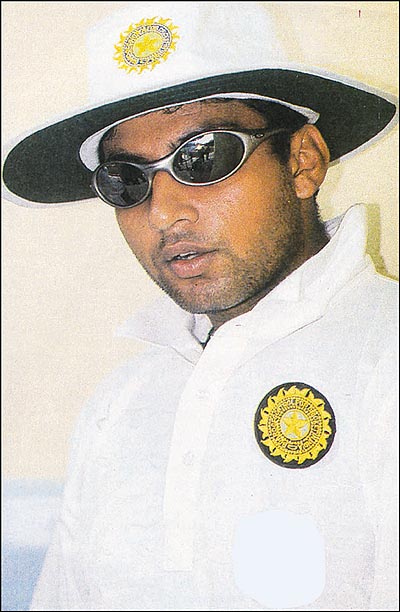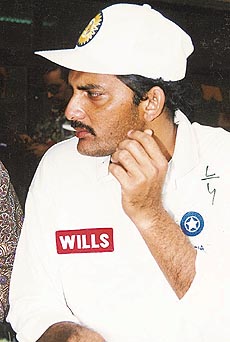Gamble to win
By Ashwini
Bhatnagar
THE Indian cricket team is leaving
for England to participate in the World Cup in the next
few hours but doubts persist. Should the selectors have
acted quickly, and decisively gambled on Ajay Jadeja as
the captain for the World Cup in place of Mohammed
Azharuddin? Or was it too late in the day to bring about
such a big change? After all, cricket is a game of
chance. Therefore, would it have been appropriate if the
"five wise men" had chanced their arm and given
it a shot considering that they had very little to lose?
As of date, anyway, not many pundits are willing to bet
on India making it to the finals, much less than winning
the Cup. So where lies the rub?

The clamour for Jadeja
as captain started during the Sharjah tournament. So long
as Azhar led his "boys", the showing was poor,
to say the least. Cricket fans had the mortification of
witnessing their team being beaten hollow in all
departments of the game. It appeared as if the team was
paralysed in body and mind, while the rivals belted them
during the entire duration of the 100-odd overs. Then
Azhar suffered an injury. Jadeja came in as a stand-in
captain. The team was transformed. From bleating lambs
being led to slaughter, they changed into battering rams.
The stand-in captain won the two games on the trot. It
seemed that there was hope yet for the Indians.
Of course, the turning
points in both the games were a result of the initiatives
taken by Jadeja. He brought himself to bowl during the
match against England and scapled three wickets in just
six balls. It is another matter that the man had not
bowled even a single delivery in an international match
in the last two years. The decision surprised even
veteran players and commentators like Geoff Boycott. But
it was a bold gamble and it paid off. After all, fortune
favours the brave. Jadeja displayed his temperament for
taking the situation by the horns once again when India
played and won against Pakistan. His decisions and
actions on the field are now part of Jadeja-lore.
Of course, a couple of
initiatives here and there do not prove beyond doubt that
Jadeja is a natural leader of men or a consummate
strategist. But certainly they are pointers to the
overall native skills of the player. The eight matches
that he has captained in the last few years have all had
the Jadeja stamp on them. If one looks at them carefully,
the Jadeja characteristics are:
Nonchalance: Even
in the worst of situations, Jadeja is a cool customer.
Even as a number five or six bat, he can lift his innings
according to the needs of the team. His one-day
international average is about 37, which is pretty good
for a player who comes in when there are not many overs
left to play. He has always managed to rotate the strike
when needed or tonked bowlers all over the ground in
order to lift the pressure from his other colleagues. He
approaches the batting crease without a care in the world
and manages to stay unruffled, whatever the pressures.
Improviser:
Jadeja is perhaps the only true improviser that we have
in the Indian team. Most bowlers are perplexed by his
innovative stroke play. One moment, Jadeja can be a
typical copybook cricketer, and the next one he makes his
own rules. Unlike Dravid, who at times has to make a
conscious effort to get out of the straight-
bat-behind-the-line-of-the-ball training, Jadeja is a
natural player when it comes to devising ways and means
of how the bat is going to meet the ball and where it
goes after the meeting. He slips effortlessly from the
orthodox to the flamboyant and back again to get the
results he or his team wants.
Risk-taker: His
batting style and the running between the wickets show
that if there is even half a chance, Jadeja will take it
smilingly. He knows intuitively what to take and what to
avoid. It is perhaps this ability which has helped him to
turn even the most difficult situation into a fluid one.
In fact, cricket lovers sat up and took notice of Jadeja
as captain because he took the risk of bringing himself
to bowl when the going was tough against England in
Sharjah.
 Motivator: Jadeja got his team to
perform in the two matches that he captained in Sharjah.
Before he took over from an "injured" Azhar,
the Indian camp had looked despirited and lacklustre.
Television images brought the listlessness in the Indian
squad to every home, and it was as clear as daylight that
the team was not performing as a cohesive unit. The
contrast was all the more stark when one watched the
highly charged performance of the Pakistani team. As long
as Azhar was on the field, the going was lacklustre.
Jadeja came mid-match and changed everything. The same
"boys" lifted themselves by their bootstraps
and performed at near-peak levels. The level dipped again
when Azhar returned as captain. A news agency report on
the finals between India and Pakistan hit the nail right
on the head when it reported, "Azharuddin returned
as captain to lead India to a humiliating eight-wicket
defeat at the hands of Pakistan in a one-sided
final....ending his team’s string of successes under
Ajay Jadeja’s stewardship." Motivator: Jadeja got his team to
perform in the two matches that he captained in Sharjah.
Before he took over from an "injured" Azhar,
the Indian camp had looked despirited and lacklustre.
Television images brought the listlessness in the Indian
squad to every home, and it was as clear as daylight that
the team was not performing as a cohesive unit. The
contrast was all the more stark when one watched the
highly charged performance of the Pakistani team. As long
as Azhar was on the field, the going was lacklustre.
Jadeja came mid-match and changed everything. The same
"boys" lifted themselves by their bootstraps
and performed at near-peak levels. The level dipped again
when Azhar returned as captain. A news agency report on
the finals between India and Pakistan hit the nail right
on the head when it reported, "Azharuddin returned
as captain to lead India to a humiliating eight-wicket
defeat at the hands of Pakistan in a one-sided
final....ending his team’s string of successes under
Ajay Jadeja’s stewardship."
Gregariousness:
Unlike Azhar, Jadeja likes to interact with his
fellow-players. Even when he is not the captain,Jadeja is
always the one to offer a word of advice or encouragement
to squad members. Most players find him easy to get along
with as he has no hang-ups. Discussing strategies,
strengths and weaknesses of team members on and off the
field in an amiable manner makes the team stick together
and pitch in with the extra effort that a particular
situation or moment may require. An off-standish stance
towards the team seldom helps.
Most cricket lovers are
of the view that the Indian team is neither short on
talent nor experience. What it needs right now are many
of the things that Jadeja combines in his personality and
are missing in the case of Azhar. His excellent rapport
with "my team" is a telling commentary on
Azhar’s own relationship with "the boys".
It is this chemistry which is vital for an event which
will see other teams bonding as virtual war machines. It
was this spirit which propelled the 1983 Indian World Cup
team to tear off the label of underdogs and emerge as Top
Guns of one-day cricket. Then, out of a squad of 11
players, 12 performed. Bits and pieces players like Roger
Binny, Madan Lal, Sandhu etc produced that extra bit
which won the day for India from the round-robbin league
to the knock-out stage. Gavaskar was, of course, there.
But how many of us remember the 1983 Cup because of him?
It was the others all the way, whether it was Mohinder
Amarnath, Srikkant or the Big Devil—Kapil Dev.
Going by the current
mood in the Indian camp, it does not look likely that the
11 players on the field will do the job of 12. We
haven’t seen the extra bits and pieces being offered
by the 11, which can combine to produce the effect of
having an extra player on the field. Azhar, therefore,
has a problem on his hands. He is not happy with the way
the media has been praising Jadeja and asking for his
scalp. He is not happy with some of the senior team
members who, he feels, should motivate themselves in the
interest of the team. Moreover, in the recent months,
Azhar has taken to publicly blaming his colleagues. In
his milder moods, he has muttered excuses such as
"We did not bat well", or "Our bowlers let
us down."
Azhar’s
unhappiness, if one is to go by the dressing room
grapevine, is more than equally reciprocated by his
team-mates. Reportedly, Kumble was not on talking terms
with his captain on the New Zealand tour because of an
argument over his "poor" bowling. And this is
not the first time that Azhar has not been exactly kind
to his co-players. Remember the Sidhu episode?
Azhar, of course, is an
old war horse. His success record as a captain is pretty
enviable. Hence, when people point out the better success
rate of Jadeja as a captain--62.5-- as against
Azhar’s 52.1, they forget that Jadeja has only eight
matches as captain to his credit. He has won five and
lost three. Azhar, on the other hand, has captained India
on 165 occasions, won 86 matches and lost 71. The others
have either been tied or abandoned. In terms of
volume,therefore, there can be no comparison. Similarly,
Azhar’s track record as a batsman and a slip fielder
is the envy of the best in the world.
Yet, there is a nagging
feeling that the selectors could have taken a calculated
risk. Propriety certainly demands that after a player has
been named captain, he should be allowed to perform as
such. But the stakes are too high. Critics do not give
any chance to India under Azhar in the sweepstakes of the
World Cup. Under Jadeja, they are willing to give the
Indians half a chance. Are we willing to take that
chance?
|

![]()

